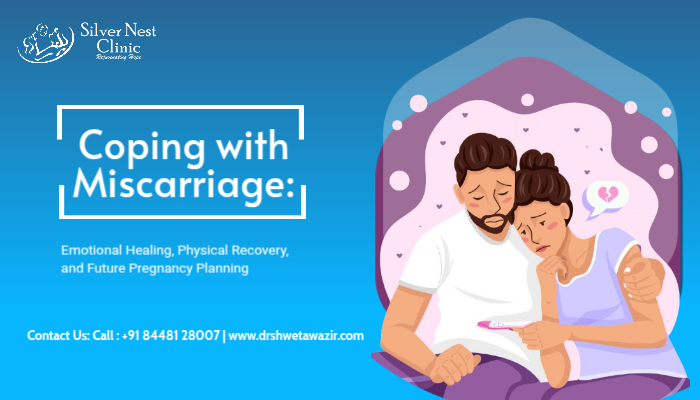A miscarriage is one of the most difficult experiences a woman and her family can go through. It not only brings physical challenges but also emotional pain, often leaving couples with questions, self-doubt, and grief. While miscarriage is common, affecting 10–20% of known pregnancies, it is important to understand that most cases are beyond anyone’s control. With the right medical care, emotional support, and future planning, many women go on to experience healthy pregnancies.
This article explores how to cope with miscarriage by focusing on three key aspects: emotional healing, physical recovery, and preparing for future pregnancies.
Understanding the Emotional Impact of Miscarriage
The Emotional Journey After Miscarriage
For many women, miscarriage feels like the sudden loss of a dream. Grief may present as sadness, anger, guilt, or even numbness. These emotions are normal. Partners may also struggle, though they often express grief differently.
Common feelings after miscarriage include:
- Shock and disbelief – especially if there were no prior warning signs.
- Guilt or self-blame – despite most miscarriages being caused by chromosomal or biological abnormalities.
- Anxiety about future pregnancies – fear of recurrence is natural.
- Depression or social withdrawal – some women may feel isolated or misunderstood.
Strategies for Emotional Healing
- Allow yourself to grieve: Grief has no timeline. Acknowledge your emotions instead of suppressing them.
- Seek support: Talking with your partner, family, or friends can help. Support groups for pregnancy loss can also be invaluable.
- Counseling and therapy: Professional counseling may assist women and couples in processing grief and reducing the risk of prolonged depression.
- Mind-body practices: Yoga, meditation, and journaling may ease stress and promote emotional balance.
Physical Recovery After Miscarriage
What Happens Physically After a Miscarriage?
The physical process of recovery depends on the type of miscarriage and how it is managed. Women may experience:
- Vaginal bleeding for one to two weeks.
- Cramping, similar to or stronger than menstrual cramps.
- Fatigue as the body adjusts to hormonal changes.
In cases where the uterus does not empty fully, doctors may recommend medication or surgical procedures such as Dilation and Curettage (D&C).
Medical Care and Follow-Up
After a miscarriage, it is essential to follow your doctor’s advice. Care usually includes:
- Ultrasound scans to confirm that the uterus is clear.
- Blood tests to check hormone levels (such as hCG).
- Infection monitoring: Heavy bleeding, fever, or foul-smelling discharge should be reported immediately.
Physical Self-Care Tips
- Avoid inserting anything into the vagina (tampons, intercourse) for at least two weeks to reduce infection risk.
- Rest and gradually resume normal activities.
- Take prescribed medications and supplements, including iron if significant blood loss occurred.
- Focus on a balanced diet rich in protein, iron, and vitamins to support recovery.
Future Pregnancy Planning After Miscarriage
When Can You Try Again?
Most doctors recommend waiting until after at least one normal menstrual cycle before trying again. This allows the body to reset hormonally and gives women time to recover emotionally. However, timing should always be discussed with a gynecologist, as recommendations may vary based on individual circumstances.
Chances of a Healthy Pregnancy After Miscarriage
The good news is that most women (about 87%) go on to have normal pregnancies after a miscarriage. A single miscarriage does not usually indicate long-term fertility problems.
Women who experience recurrent miscarriages (three or more) may need further investigations, such as:
- Genetic testing for both partners.
- Blood tests to rule out autoimmune or hormonal disorders.
Imaging studies (hysterosalpingogram, hysteroscopy, or laparoscopy) to examine uterine health.
Reducing the Risk in Future Pregnancies
- Attend all prenatal appointments for early monitoring.
- Take prenatal vitamins with folic acid before conception.
- Manage chronic conditions such as diabetes or thyroid disorders.
- Avoid alcohol, smoking, and recreational drugs.
- Maintain a healthy weight and stay physically active.
- Discuss all medications with your doctor before trying to conceive.
Supporting Your Relationship Through Miscarriage
Miscarriage affects not only women but also their partners. Couples may grieve differently, which can sometimes create misunderstandings. Maintaining open communication is vital. Supporting each other emotionally strengthens the relationship and provides a shared sense of healing.
Myths and Misconceptions About Miscarriage
- Myth: Stress causes miscarriage.
There is no scientific evidence that everyday stress leads to miscarriage. - Myth: Exercise or sex during pregnancy causes miscarriage.
Normal physical activity and sexual intercourse are safe in most pregnancies unless your doctor advises otherwise. - Myth: One miscarriage means you cannot have children.
Most women go on to have healthy pregnancies after miscarriage.
Dispelling these myths helps reduce guilt and emotional burden.
When to Seek Immediate Medical Help
After a miscarriage, seek urgent care if you experience:
- Heavy bleeding soaking through pads within an hour.
- Severe abdominal pain not relieved by medication.
- Fever, chills, or foul-smelling discharge.
- Dizziness or fainting spells.
Prompt treatment prevents complications and ensures faster recovery.
Conclusion
A miscarriage can be emotionally and physically overwhelming, but it does not define your future fertility or ability to become a parent. With proper medical guidance, emotional healing, and lifestyle adjustments, most women can look forward to successful pregnancies.
If you have experienced a miscarriage, give yourself the time and care you need. Surround yourself with support, consult an experienced gynecologist, and plan your next steps with confidence.
For compassionate guidance, expert pregnancy care, and personalized treatment plans, consult Dr. Shweta Bansal Wazir, a trusted obstetrician and gynecologist.
📞 +91 84481 28007 | 🌐 www.drshwetawazir.com


Leave A Comment